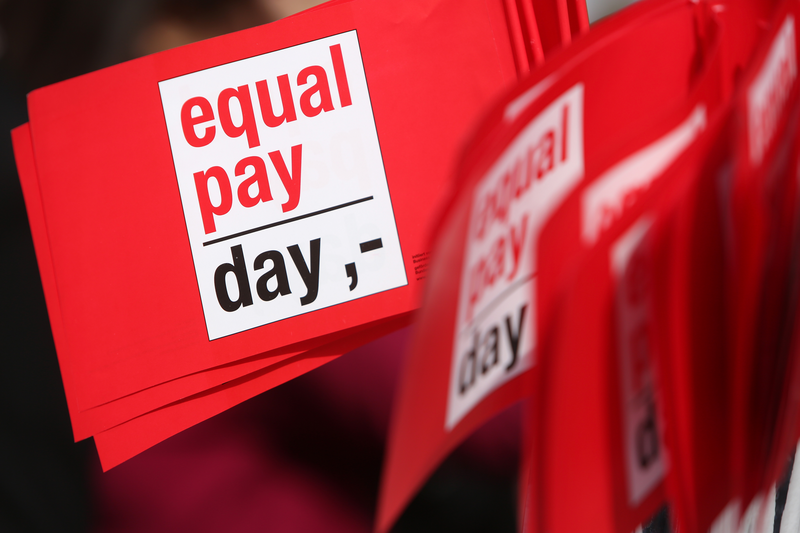The EU Gender Pay Gap (the difference between the average gross hourly earnings of working men and women) remains at 13% according to a European Commission statement published on November 14, 2023. The statement was issued in the context of Equal Pay Day, which marks the date symbolizing how many more days women must work until the end of the calendar year to earn what men earned by the same date.
This year, Equal Pay Day fell on November 15, 2023. The current EU Gender Pay Gap remains the same as last year. Against the backdrop of this stagnant Gender Pay Gap across the EU, the European Commission has advanced measures to improve equality between women and men in the EU over the last few years.
The most notable of these measures is the EU Pay Transparency Directive (the Directive), which came into force in June 2023. The current EU Gender Pay Gap is only 1% lower than the figure cited in the European Commission’s original proposal for the Directive in early 2021, signalling that the new requirements will play an important role in driving forward progress.
This article summarises the Directive’s key requirements and what organizations should be doing in preparation for implementation, as well as commenting more generally on some of the other broader Diversity, Equity and Inclusion (DE&I) developments that have occurred in the UK recently.
EU Pay Transparency Directive
The Directive introduces extensive enforcement mechanisms, including:
- Gender Pay Gap reporting obligations across the EU (backed up by enforcement mechanisms);
- requirements to remedy pay gaps of 5% (or more) in cooperation with workers’ representatives; and
- various other pay transparency obligations, including in respect of access to pay information for applicants and employees.
The Directive will introduce extensive pay transparency obligations in many EU countries that currently have no, or few, pay transparency requirements. Further, other member states that have already introduced various pay transparency requirements will likely need to further legislate to address the additional obligations the Directive introduces and consider any existing domestic legislation that conflicts with the Directive’s provisions.
Except for the gender pay reporting obligations, the Directive’s requirements will apply irrespective of headcount (subject to some limited exceptions). It is worth noting that the European Commission is dedicating €6.1m ($6.6m) to support the implementation of the Directive in Member States, which have three years to transpose the Directive into domestic law (ie, by June 7, 2026).
The Directive may create a number of challenges for employers operating in the EU, including:
- Compliance costs and an increased administrative burden: Many employers will have to consider whether existing systems are able to collect the necessary data that the Directive requires and potentially adapt existing pay databases. Employers may also need to offer certain training to staff, for example on preparing gender pay reports and responding to requests for information.
- Litigation: Employers should note that there have been several high-profile equal pay cases in Belgium, France, and the UK, in which female claimants were successful only because they had access to the necessary information regarding the average pay levels of their male colleagues. Increased transparency may increase the risk of pay equity litigation and employers should consider if they have assessed their pay practices and are prepared to defend such claims.
The good news is that employers have time to prepare. That said, companies that begin considering how they will assess and record pay data across their organisation, and identifying and addressing areas of potential risk, will be better placed to take steps to comply with any deadlines as and when they become enforceable.
In this context, employers should consider:
- reviewing the requirements of the Directive so that relevant team members are up-to-speed with the requirements and can advise the business more generally;
- conducting pay audits to identify and proactively address any pay inequalities and also to better understand their existing pay practices;
- assessing headcounts in each country to establish where reporting obligations will be triggered;
- reviewing internal pay policies, job evaluation systems, job descriptions and job adverts to check that they are gender neutral and based on objective criteria;
- developing pay ranges based on objective and gender neutral criteria;
- reviewing template employment contracts to remove any pay secrecy type clauses;
- if applicable, phasing out or prohibiting HR/recruiters/talent teams asking about candidate pay history;
- developing policies to govern how relevant personnel will respond to employees exercising their pay transparency rights; and
- verifying whether their payroll systems and job descriptions are sufficiently granular to allow responsible personnel to comply with pay transparency obligations more easily.
The Directive is not directly applicable to UK employers. However, it could still be relevant to UK companies with EU operations. Further, it is possible that the Directive’s implementation across the EU might re-set employee expectations in respect of an employer’s pay transparency efforts more generally, and certain employers may consider implementing a consistent approach regarding pay transparency across their UK and EU businesses as a result. The UK government is also currently reviewing the UK Gender Pay Gap reporting regulations. It is therefore possible that the UK’s regime may be adapted to fall more in line with the Directive in due course.
Other UK DE&I matters
Taking legislative and/or regulatory steps to address static Gender Pay Gaps is not constrained to the EU. In the UK, where gender pay reporting obligations and other pay transparency requirements (for example prohibitions on pay secrecy clauses and pay disclosure obligations for public companies) already exist, there have been a series of related DE&I developments recently.
FCA & PRA action
The UK’s financial services regulators, the Prudential Regulation Authority (PRA) and Financial Conduct Authority (FCA), are currently consulting (links to FCA and PRA consultations) on proposals to introduce a new regulatory framework on diversity and inclusion in the financial sector. The consultation closes on December 18, 2023, and considers a series of measures designed to promote positive DE&I outcomes in the financial sector.
Key proposals include the reporting of diversity and inclusion data and targets, allocation of diversity and inclusion responsibility to relevant Senior Management Functions and publication of a firm-wide diversity and inclusion strategy. It is also proposed that findings about individuals’ conduct for issues such as bullying, sexual harassment and discrimination should form part of fitness and propriety assessments.
The consultation is taking place shortly following the PRA and FCA announcing the removal of the cap on bonuses that can be paid to material risk takers at banks, building societies, and PRA-designated investment firms. There has been a mixed reaction to this announcement and Gender Pay Gap-related risks, presumably due to concerns regarding the relaxation of variable pay, have been expressly considered by the regulators in their bonus cap consultation.
As referenced in the statement, “[t]here is evidence suggesting that gender pay gaps in bonuses are typically larger than in fixed pay, and that the banking sector may have high gender pay gaps.” With this in mind, the joint statement warned firms that the regulators “expect firms to take care to avoid adverse impacts on pay gaps when using this increased flexibility to set more appropriate pay ratios.”
EHRC names organizations failing to report Gender Pay Gap data
Earlier this year, the Equality and Human Rights Commission (EHRC) published the names of eight organisations that failed to comply with the UK’s Gender Pay Gap reporting requirements. Warning notices were sent to 730 employers that had failed to meet the deadlines in March and April 2023, and, of these, eight had still not reported their data in the few months following – leading to their “naming and shaming” on July 6, 2023.
The UK’s gender pay reporting regime is often criticised for not containing any civil enforcement mechanisms or sanctions. The EHRC’s recent measures, however, serve as a reminder that it is incorrect to say that there will be no consequences at all for failing to comply with reporting obligations. The primary impact in the UK is of course reputational rather than financial, as illustrated by the EHRC’s recent actions.
That said, the EHRC does have powers to carry out investigations to confirm whether an organisation is breaching the regulations. If it determines that this is the case, it can send an organisation a statutory “unlawful act notice”. The EHRC has the right to seek a court order against an employer who fails to comply with such a notice – and failing to comply is an offence that is, in theory, punishable with an unlimited fine.
Comparison with US
While the direction of travel in Europe points towards greater pay transparency and DE&I efforts, the position in the United States is in a state of flux. Recent legal developments in the US have led to resistance by some groups to employers’ DE&I efforts, particularly following the Supreme Court’s decision in affirmative action cases involving Harvard University and the University of North Carolina.
Employers, including in the financial services sector, with a presence in the United States will need to consider how to balance emerging global regulatory requirements (including the Directive and UK regulatory proposals) with ongoing legal risk.
Louise Skinner is a partner and she provides sophisticated, strategic advice on all aspects of employment law, with particular focus on regulatory employment matters. Will Mallin is an associate, advising clients on a range of contentious and non-contentious employment matters in addition to employment aspects of corporate transactions. Morgan Lewis


















